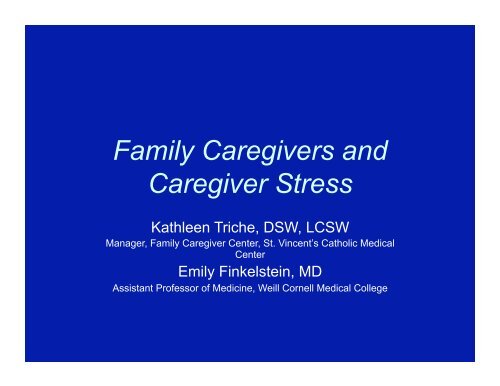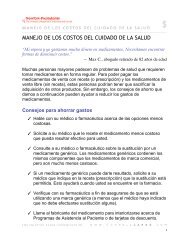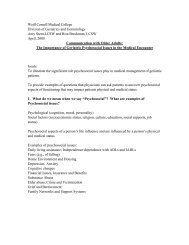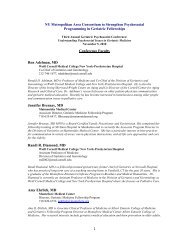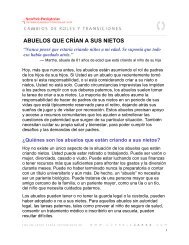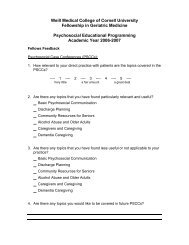View Power Point Presentation (PDF) - Cornell CARES
View Power Point Presentation (PDF) - Cornell CARES
View Power Point Presentation (PDF) - Cornell CARES
Create successful ePaper yourself
Turn your PDF publications into a flip-book with our unique Google optimized e-Paper software.
Family Caregivers and<br />
Caregiver Stress<br />
Kathleen Triche, DSW, LCSW<br />
Manager, Family Caregiver Center, St. Vincent’s Catholic Medical<br />
Center<br />
Emily Finkelstein, MD<br />
Assistant Professor of Medicine, Weill <strong>Cornell</strong> Medical College
Caregiver<br />
definition<br />
• A caregiver is one who helps manage<br />
tasks of daily living: including the<br />
management of symptoms and the<br />
integration of the patient’s treatment<br />
regimen into his or her patterns of daily<br />
life.<br />
• Lane, Hyer and Leventhal, 2005
Demographics<br />
• 45 million caregivers of family and friends<br />
in US<br />
• 23 million households are home to<br />
caregiver (AARP survey, 2004)<br />
• 43 per cent are over 50<br />
• 13 per cent over 65
Issues<br />
• Caregivers give up job transfers and<br />
advancements, miss vacations, abandon<br />
hobbies, neglect their own health.<br />
• They give up supportive relationships -<br />
they lose networks and friends<br />
• Financial strain - because Medicare,<br />
private insurance and Medicaid assistance<br />
is limited, caregivers use up financial<br />
resources
What is known about this<br />
dynamic?<br />
• Caregiver burden<br />
– Physical<br />
– Emotional<br />
– Financial<br />
• Benefits<br />
Sick Child, Edvard Munch (1907)
Stress and Caregiving<br />
• Caregivers are at risk for many mental and<br />
physical illnesses<br />
• Results from stress, exhaustion, selfneglect
Research<br />
• Caregivers more likely to get infectious<br />
diseases<br />
• Slower to heal from wounds<br />
• Greatly elevated blood levels of chemical<br />
linked to chronic inflammation<br />
• Puts them at increased risk for heart<br />
disease, arthritis, diabetes, cancer<br />
• Janice Kiecolt-Glaser and Ronald Glaser
Research<br />
• Caregivers risk continues several years<br />
after caregiving duties end<br />
• Highest risk for caregivers over 65<br />
• Increased risk for anxiety and depression<br />
• Keicolt-Glaser
Mr. and Mrs. P<br />
• 78 yo female seen as new patient for<br />
memory loss and increased anxiety<br />
• Brought into office by grandchildren,<br />
accompanied by husband<br />
• Evaluation led to diagnosis:<br />
– Alzheimer’s dementia
Mr. and Mrs. P<br />
• Over time, patient continued to decline<br />
predictably.<br />
• Mr. P is primary caregiver<br />
– Has resisted all help
Mr. and Mrs. P<br />
• Crisis:<br />
– Mr. P prepares for routine cataract extraction.<br />
Pre-op evaluation reveals new heart murmur.<br />
ECHO shows 3+ MR, cardiac cath reveals<br />
triple vessel disease.<br />
– He needs urgent valve replacement and<br />
CABG
Mr. and Mrs. P<br />
• Mr. P accepts help from son and dtr-in-law<br />
who arrange to have Mrs. P stay with them<br />
while Mr. P in hospital<br />
• Mr. P continues to worry about Mrs. P<br />
above himself<br />
• Son more objective, able to listen to<br />
options – i.e. hiring help, etc.
“O Through 9”, Jasper Johns (1961)
Mrs. S<br />
• 93 yo female with advanced dementia<br />
• Moved back from Florida to stay with<br />
daughter in Manhattan, who assumed<br />
primary caregiving role, and brought<br />
patient to office for transfer of medical care
Mrs. S<br />
• As Mrs. S declined, her office visits<br />
became more frequent for:<br />
– UTIs<br />
– Falls<br />
– Confusion<br />
– Agitation<br />
– Depression
Mrs. S<br />
• Daughter with patient 24/7<br />
• Gave up job, re-arranged her studio<br />
apartment<br />
• Declined to accept help<br />
• Stress level increasing
Mrs. S<br />
• Daughter eventually agreed to caregiver<br />
support group<br />
• Then agreed to day care program<br />
• Then agreed to hire help for several hours<br />
per day
Mrs. S<br />
• Patient eventually became bedbound, was<br />
referred for home hospice after many<br />
conversations with daughter.<br />
• After pt’s peaceful death at home,<br />
daughter was devastated, but also<br />
relieved, and very proud.
Who are caregivers?<br />
The Gulf Stream, Winslow Homer (1899)
Mrs. E. B.<br />
• Mrs. B is an 81 year old widowed woman<br />
with middle stage dementia.<br />
• She lives in Connecticut in a Senior<br />
Building sponsored by HUD<br />
• She has a social worker and home<br />
attendant services 6 hours per day<br />
• She is alone the rest of the time
Caregiver<br />
• Ms. B has 8 children<br />
• 5 of the children abuse alcohol or drugs<br />
• One son manages her finances and visits<br />
Sundays<br />
• Daughter M. lives in NYC and shares the<br />
caregiving responsibilities with brother<br />
• M. is married, has an 11 year old daughter
Caregiving issues<br />
• Family history: Mrs. B’s husband was an<br />
alcoholic and abused the children<br />
• Mrs. B. was withdrawn, a distant and<br />
critical mother and did not believe the<br />
children were being hurt<br />
• M., the daughter, was traumatized by the<br />
abuse and is experiencing painful<br />
memories as she cares for mother.
Services<br />
• M. is in individual psychotherapy and on<br />
medication for depression<br />
• M. is in a caregiver support group and is<br />
able to share her experiences with other<br />
sons and daughters who grew up in<br />
abusive families.<br />
• Issues related to her mother, her current<br />
family including her daughter are<br />
addressed.
Reaching out for help<br />
• Many caregivers try to do everything by<br />
themselves<br />
• Family roles/traditions often influence this<br />
• Caregivers often don’t know where to go<br />
for help or what to do first<br />
• Some see it as weakness to accept help (I<br />
should be able to do this)
Emotions<br />
• Profound sadness<br />
• Rage<br />
• Empathy and love<br />
• Guilt over the anger and frustration<br />
• Upset feelings over sacrificing careers,<br />
love relationships, friendships, dreams<br />
• Jed Levine, Alzheimers Association
Emotions<br />
• Embarrassment and shame when their<br />
feelings are revealed to others, including<br />
helpers<br />
• Unresolved family dynamics may get<br />
activated. Sibling rivalry, step-parents,<br />
second marriages may complicate things.<br />
• Often older people (70’s and 80’s) find it<br />
difficult to talk about their feelings
Ethnic Differences<br />
• Caregiving differs with ethnicity and<br />
cultural backgrouds<br />
• Research suggests that Hispanic and<br />
African American caregivers are less likely<br />
to admit being stressed, burdened or<br />
depressed by caring for loved ones<br />
• But researches find they have high levels<br />
of depression and stress
Ethnic Differences<br />
• Studies show that Hispanic and African<br />
American caregivers report have to<br />
struggle to patient needs met.<br />
• Resources may not be easy to obtain.
Cultural and Age Issues<br />
• Cultural and age barriers should be<br />
considered
Providing help<br />
• Encourage caregiver to find a caregiving<br />
buddy - a person who’s facing a similar<br />
situation and could be a confidante<br />
• Encourage joining a support group<br />
• Patience from family and friends<br />
• Acknowledge the job caregiver is doing.<br />
Validate stress.
Providing help<br />
• Help can be simple: giving caregiver<br />
respite so they can do things like get a hair<br />
cut, go to the doctor<br />
• Paperwork help is useful<br />
• Recommendations from a health care<br />
provider whom the caregiver trusts is<br />
helpful.
Helpful interventions<br />
• Listening<br />
• Monitoring health problems (sleep<br />
deprivation, exhaustion, limping, falls)<br />
• Encouraging them to get mammograms,<br />
flu shots, checkups.<br />
• Recognize when additional professional<br />
help is needed including referrals for<br />
antidepressant medication and therapy
Spousal Issues<br />
• Usually older<br />
• Sensitivity to relationship issues<br />
• Long existing relationship issues may<br />
surface<br />
• Battles with adult children, especially<br />
around caregiving, placement, financial<br />
issues<br />
• Marital conflict may be reactivated.
Spousal caregivers<br />
• Inability to communicate as they once did<br />
• Relational deprivation<br />
• Loss of reciprocity with spouse with<br />
dementia<br />
• Positive feeling of “we are in this together”<br />
ends<br />
• Produces sadness and feeling of loss
Adult Children as Caregivers<br />
• Unresolved issues may arise<br />
• Idea of giving back to some who took care<br />
of him or her<br />
• Adult children who were abused as<br />
children may have difficulty with this role.<br />
• Issues of financial or physical abuse may<br />
occur.
Mother and Child, Keith Haring (date unknown)
Gender issues<br />
• AARP article says men seem to be less<br />
depressed or isolated. However, men less<br />
often seek professional help<br />
• However, alcoholism and some abusive<br />
behavior due to frustration can appear.
Seeking help<br />
• Seeking help is the best positive move<br />
• Finding spiritual peace<br />
• Easing stress<br />
• Deep breathing/ relaxation methods<br />
• Simple meditation<br />
• Mind-body healing - Herbert Benson, MD
ThisCaringHome.org<br />
Rosemary Bakker, MS, ASID, Weill <strong>Cornell</strong> Medical College


